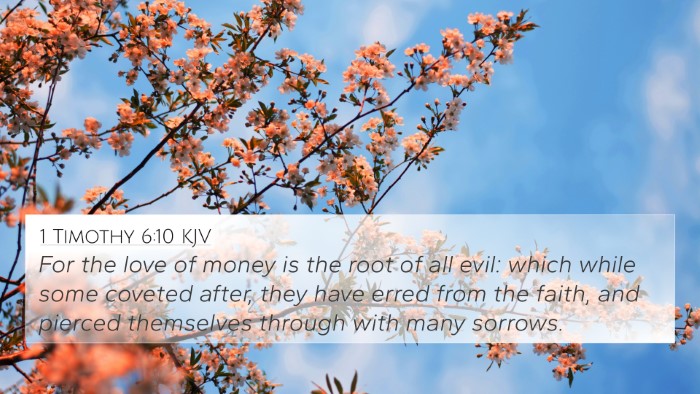Understanding Acts 16:19
Acts 16:19 states: "And when her masters saw that the hope of their gains was gone, they caught Paul and Silas, and drew them into the marketplace unto the rulers."
Meaning and Interpretation
This verse occurs during Paul and Silas’s missionary journey in Philippi, where they encounter a slave girl possessed by a spirit of divination. Her owners exploited her condition for financial gain. The master’s reaction to Paul’s intervention sheds light on the tension between spiritual authority and economic interests.
Key Insights from Commentaries
-
Matthew Henry:
Henry emphasizes the profound impact of losing profits from the slave girl, illustrating how economic motives can lead people to oppose divine truth. This indicates the challenge that believers may face when their message threatens the established economic order.
-
Albert Barnes:
Barnes points out that the astonishment of the masters becomes a catalyst for the persecution of Paul and Silas. Their focus on monetary loss over spiritual liberation reflects the world's tendency to prioritize materialism over morality.
-
Adam Clarke:
Clarke explains the cultural context of servitude, highlighting that this girl was both a victim of human exploitation and a symbol of spiritual captivity. Her deliverance marks a crucial moment of transition, calling attention to the societal implications of spiritual interventions.
Cross-References in the Bible
Acts 16:19 resonates with numerous other biblical narratives, illustrating overarching themes of liberation, spiritual authority, and the conflict between spiritual and material powers. Key cross-references include:
- Luke 4:18-19: Jesus’s proclamation of freedom for the oppressed.
- Matthew 7:22-23: The reality of false prophets profiting from spiritual deception.
- 1 Timothy 6:10: Warning against the love of money, which serves as a key motivator for the actions in Acts 16:19.
- Romans 1:18: The friction between human interests and divine will.
- James 5:1-6: A condemnation of greed and exploitation by the wealthy.
- John 10:10: Jesus speaks of the thief coming only to steal, kill, and destroy, while He offers life abundantly.
- Galatians 5:1: The call to stand firm in the freedom granted by Christ.
Connecting Themes and Biblical Analysis
The conflict in Acts 16:19 raises significant questions about the nature of authority—both human and divine. By examining the inter-biblical dialogue surrounding this verse, one can observe connections that highlight:
- Spiritual Authority vs. Economic Interests: The owners' anger illustrates the ongoing struggle between profit-driven motives and spiritual integrity.
- Deliverance and Opposition: The narrative reflects a repeated biblical theme wherein acts of divine liberation elicit opposition, seen also in the ministry of Jesus and the early church.
- Impact of Spiritual Warfare: This incident forms part of the broader theme of spiritual warfare that runs throughout Scripture, showcasing God's power over demonic forces.
Tools for Cross-Referencing
To fully appreciate the connections and cross-references related to Acts 16:19, one can utilize various tools:
- Bible Concordance: A useful resource for locating themes and words across Scripture.
- Bible Cross-Reference Guide: Helps identify direct and indirect relationships between verses.
- Bible Chain References: A method for tracing thematic stories or theological concepts throughout the Bible.
- Cross-Referencing Bible Study Methods: Techniques to engage with Scripture deeply and systematically.
- Comprehensive Bible Cross-Reference Materials: Resources that provide extensive cross-referencing functionality.
Conclusion
In conclusion, Acts 16:19 serves as a pivotal moment in the narrative of the apostles, illustrating the clash between spiritual deliverance and economic exploitation. By engaging with public domain commentaries and exploring scriptural cross-references, readers can broaden their understanding of the themes at play, as well as their implications in both the historical and contemporary contexts of faith. The intricate connections between various Bible verses provide a rich tapestry that enhances the biblical narrative, encouraging deeper exploration of the interconnectedness of God’s Word.



















